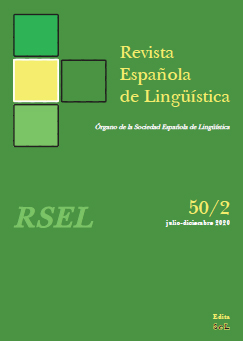Capaz as a marker of epistemic modality: Adjective, adverb, or something else?
https://dx.doi.org/10.31810/RSEL.50.2.6
Keywords:
Epistemic modality; grammatical category; adjective; adverb; sentential particle; Speech Act Phrase.Abstract
This paper deals with a group of expressions containing the vocable capaz ‘able’ used to communicate the probability the propositional content coming true (ex., Es que capaz que venga/viene «it is possible that s/he comes», Capaz que venga/viene «possible that s/he comes» and Capaz viene/venga «possible s/he comes»). Since descriptions of capaz in dictionaries and in the grammar are varied and lack consensus, this study will focus on the expressions of probability containing capaz with the aim to clarify the number of lexical units within the vocable, their grammatical status as well as possible semantic (and/or pragmatic) differences. From the syntactic viewpoint, it will be firstly verified whether the expressions under analysis are mono-clausal or bi-clausal structures; secondly it will be also examined which properties of capaz are associated with the category of adjectives and which ones with the category of adverbs. The distribution of capaz within the sentence paying special attention to its syntactic position, its compatibility with other expressions of the same type and its capacity to constitute independent statements will be also analysed. The results will allow for determining the scope of this/these unit/s, which will be a key factor to ascertain the number, grammatical status and semantic values of capaz, as well as the level of analysis where it is (or they are) located.
Downloads
References
Alemany Bolufer, J. (1917): Diccionario de la lengua española, Barcelona, Sopena.
Boogaart, R. (2007): «The past and perfect of epistemic modals», en Saussure, L. de, Moeschler, J. y Puskás, G. (eds.), Recent advances in the syntax and semantics of tense, aspect and modality, Berlín/Nueva York, Mouton de Gruyter, pp. 47-69.
Bosque, I. (1987): «Constricciones morfológicas sobre la coordinación», Lingüística española actual 9, pp. 83-100.
–, (1989): Las categorías gramaticales. Relaciones y diferencias, Madrid, Síntesis.
Bravo, A. (2017): Modalidad y verbos modales, Madrid, Arco/Libros.
Castroviejo, E. y Oltra-Massuet, I. (2015): «On capacities and their espistemic extensions», en Tortora, C., den Dikken, M., Montoya, I. y O’Neill, T. (eds.), Romance linguistics 2013, Ámsterdam/Filadelfia, John Benjamins, pp. 59-78.
Castroviejo, E. y Oltra-Massuet, I. (2016): «What does be capable tell us about capacities? An answer from Romance», en Martin, F., Pitteroff, M. y Pross, T. (eds.), Morphological, syntactic and semantic aspects of dispositions, Stuttgart, University of Stuttgart, pp. 30-51.
Castroviejo, E. y Oltra-Massuet, I. (2018): «Generic and action-dependent abilities in Spanish ‘be capable’», Glossa: A journal of general linguistics 3, 1, pp. 1-32.
CDH = Real Academia Española, Corpus del nuevo diccionario histórico del español, <http://web.frl.es/CNDHE/view/inicioExterno.view>.
CORDE = Real Academia Española, Corpus diacrónico del español, <http://corpus.rae.es/cordenet.html>.
CORPES XXI = Real Academia Española, Corpus del español del siglo XXI, <http://web.frl.es/CORPES/view/inicioExterno.view>.
CREA = Real Academia Española, Corpus de referencia del español actual, <http://corpus.rae.es/creanet.html>.
Cruschina, S. (2015): «The expression of evidentiality and epistemicity: Cases of grammaticalization in Italian and Sicilian», Probus 27, 1, pp. 1-31.
Cuervo, R. J. (1867-1872): Apuntaciones críticas sobre el lenguaje bogotano con frecuente referencia al de los países de Hispano-América, 5.ª ed., París, A. & R. Roger y F. Chernoviz Editores, 1907. https://archive.org/details/apuntacionescr00cueruoft/page/n7
DA = ASALE (2010): Diccionario de americanismos, Madrid, Santillana. <https://www.asale.org/recursos/diccionarios/damer>.
Di Tullio, Á. y Suñer Gratacós, A. (2002): «Relaciones entre léxico y modalidad: el anclaje deíctico de las expresiones interjectivas», en Bernabé Pajares, A., Berenguer Sánchez, J. A., Cantarero, M. y Torres Martínez, J. C. de (eds.), Presente y futuro de la lingüística en España. La Sociedad de Lingüística, 30 años después, Madrid, SEL, pp. 155-163.
Di Tullio, Á. y Kornfeld, L. (2013): «Marcas de modalidad epistémica en el registro coloquial», en Di Tullio, Á. (ed.), El español de Argentina: estudios gramaticales, Buenos Aires, Edeba, pp. 83-103.
DLE = RAE y ASALE (2014): Diccionario de la lengua española, 23.ª ed., Madrid, Espasa.
DPD = RAE y ASALE (2005): Diccionario panhispánico de dudas, Madrid, Santillana. <https://www.rae.es/recursos/diccionarios/dpd>.
DPDE = García Negroni, M. M. (2012): «Capaz (que)», en Briz, A., Pons, S. y Portolés, J. (coords.), Diccionario de partículas discursivas del español, 2008. .
esTenTen18 = Sketch Engine, Spanish Gigacorpus, <https://www.sketchengine.co.uk>.
Fuentes Rodríguez, C. (2009): Diccionario de conectores y operadores del español, 2.ª ed., Madrid, Arco/Libros, 2018.
García Fernández, L. y Bravo, A. (2013): «El verbo caber como auxiliar modal», Lingüística española actual 35, 2, pp. 211-239.
García Negroni, M. M. y Sauerwein Spinola, S. (2013): «Marqueurs de discours et distanciation: une étude contrastive de peut-être, capaz et por ahí», Estudios románicos 22, pp. 53-64.
Grández Ávila, M. (2010): A Functional approach to the subjectification of facultative meaning: The case of capaz in American Spanish, Trabajo de fin de máster, Universidad de Ámsterdam.
Hengeveld, K. (1988): «Illocution, mood and modality in a functional grammar of Spanish», Journal of semantics 6, pp. 227-269.
Hengeveld, K. (2017): «A hierarchical approach to grammaticalization», en Hengeveld, K., Narrog, H. y Olbertz, H. (eds.), The grammaticalization of tense, aspect, modality and evidentiality: A functional perspective, Berlín, De Gruyter, pp. 13-37.
Hill, V. (2007): «Romanian adverbs and the pragmatic field», The linguistic review 24, pp. 61-86.
Kany, C. E. (1945): Sintaxis hispanoamericana, Madrid, Gredos, 1970.
Kornfeld, L. (2013): «Atenuadores en la lengua coloquial argentina», Lingüística 29, 2, pp. 17-49.
Laca, B. (2012): «On modal tenses and tensed modals», en Nishida, C. y Russi, C. (eds.), Building a bridge between linguistic communities of the old and the new world: Current research in tense, aspect, mood and modality, Ámsterdam/Nueva York, Rodopi, pp. 163-198.
Lyons, J. (1977): Semantics, Vol. 2, Cambridge, Cambridge University Press.
Marcovecchio, A. M. (2008): «Por ahí», en Briz, A., Pons, S. y Portolés, J. (coords.), Diccionario de partículas discursivas del español, DPDE. .
Mel’ččuk, I. (2004): «Actants in semantics and syntax I», Linguistics 42, 1, pp. 1-66.
–, (2012): Semantics. From meaning to text, Ámsterdam, John Benjamins.
–, Clas, A. y Polguère, A. (1995): Introduction à la lexicologie explicative et combinatoire, Lovaina la Nueva, Éditions Duculot.
NTLLE = RAE: Nuevo tesoro lexicográfico de la lengua española, <http://ntlle.rae.es/ntlle/SrvltGUILoginNtlle>.
Nuyts, J. (2001): Epistemic modality, Language and conceptualization: A Cognitive-Pragmatic perspective, Ámsterdam, John Benjamins.
Olbertz, H. y Dall’Aglio Hattnher, M. M. (2018): «On objective and subjective epistemic modality again. Evidence from Portuguese and Spanish modal auxiliaries», en Evelien, K. y Olbertz, H. (eds.), Recent developments in functional discourse grammar, Ámsterdam, John Benjamins, pp. 131-168.
Pietrandrea, P. (2018a): «Epistemic constructions at work. A corpus study on spoken Italian dialogues», Journal of pragmatics 128, pp. 171-191.
–, (2018b): «Epistemic sentence adverbs, epistemic complement-taking predicates and epistemic pragmatic markers», Linguistik online 92, 5, pp. 193-214.
RAE y ASALE (2009): Nueva gramática de la lengua española, Madrid, Espasa.
Rizzi, L. (1997): «The fine structure of the left periphery», en Haegeman, L. (ed.), Elements of grammar, Dordrecht, Kluwer, pp. 281-337.
–, (2004): «Locality and left periphery», en Belleti, A. (ed.), Structures and beyond. The cartograhpy of syntactic structures, Vol. 3, Oxford, Oxford University Press, pp. 223-251.
Rocci, A. (2005): «On the nature of the epistemic readings of the Italian modal verbs: The relationship between propositionality and inferential discourse relations», Cahiers chronos 13, pp. 229-246.
Rodríguez Espiñeira, M.ª J. (2014): «Emergencia e historia de la construcción es capaz que», en Bargalló Escrivá, M.ª, Garcés Gómez, M.ª P. y Garriga Escribano, C. (eds.), Llaneza. Estudios dedicados al profesor Juan Gutiérrez Cuadrado, A Coruña, Anexo de la Revista de lexicografía, pp. 205-218.
–, (2018): «Cambio semántico y sintáctico en las construcciones de capaz», en Garcés Gómez, M.ª P. (ed.), Perspectivas teóricas y metodológicas en la elaboración de un diccionario histórico, Madrid/Fráncfort del Meno, Iberoamericana/Vervuert, pp. 117-186.
–, (2019): «La expresión epistémica si cuadra en español de Galicia», Estudos de lingüística galega 11, pp. 197-231.
–, y López Meirama, B. (2008): «On the grammaticalization of the Spanish expression puede que», en Seoane, E. y López-Couso, M.ª J. (eds.), Theoretical and empirical issues in grammaticalization, Ámsterdam, John Benjamins, pp. 293-314.
Sánchez López, C. (2019): «¿Son las partículas oracionales categorías semiléxicas?», Revista española de lingüística 49, pp. 83-108.
Serret Lanchares, S. (2019): «La evolución sintáctica de la forma capaz en español», comunicación presentada en el XLVIII Simposio internacional de la Sociedad española de lingüística, Madrid, 29 de enero-1 de febrero.
Speas, P. y Tenny, C. (2003): «Configurational properties of point of view roles. In asymmetry in grammar», en Di Sciullo, A. M. (ed.), Asymmetry in grammar, Ámsterdam, John Benjamins, pp. 315-45.
Suárez Hernández, A. (2019): «Marcadores discursivos: condicionantes externos para la variación interna», comunicación presentada en el XXII Congreso de la Asociación alemana de hispanistas, Berlín, 27-31 de marzo.
Published
How to Cite
Issue
Section
Copyright (c) 2020 Revista Española de Lingüística

This work is licensed under a Creative Commons Attribution-NonCommercial 4.0 International License.






